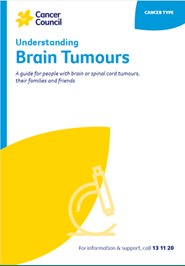- Home
- Brain tumours
- Diagnosis
Brain cancer diagnosis
Many people diagnosed with a brain or spinal cord tumour first go to their GP because they are feeling unwell. Occasionally a brain tumour will be found during an eye check-up or on a scan for something unrelated, such as a head injury. Some people have sudden symptoms (such as severe headache, a seizure or loss of consciousness) and go straight to a hospital emergency department.
The doctor will ask you about your symptoms and medical history, and do a physical examination. If they suspect you have a brain or spinal cord tumour, you will be referred for more tests to confirm the diagnosis.
Learn more about:
For an overview of what to expect throughout your cancer care for high-grade glioma, visit Guides to Best Cancer Care – High Grade Glioma. This is a short guide to what is recommended, from diagnosis to treatment and beyond.
→ READ MORE: Tests for brain cancer
Video: Diagnosis for brain cancer
Podcast: Tests and Cancer
Listen to more of our podcast for people affected by cancer
More resources
Prof Lindy Jeffree, Director of Neurosurgery, Alfred Health, VIC; Caitriona Nienaber, 13 11 20 Consultant, Cancer Council WA; Prof Tamara Ownsworth, Clinical Neuropsychologist and Research Director, The Hopkins Centre, Griffith University, QLD; A/Prof Hao-Wen Sim, Medical Oncologist, The Kinghorn Cancer Centre and Chris O’Brien Lifehouse, NSW; Megan Trevethan, Clinical Specialist Occupational Therapy – Cancer and Lymphoedema Services, Princess Alexandra Hospital, QLD; Chris Twyford, Cancer Specialist Nurse, Canberra Health Services, Cancer and Ambulatory Support, ACT; Dr Adam Wells, Clinical Academic Consultant Neurosurgeon, The University of Adelaide, Royal Adelaide Hospital, SA.
View the Cancer Council NSW editorial policy.
View all publications or call 13 11 20 for free printed copies.



